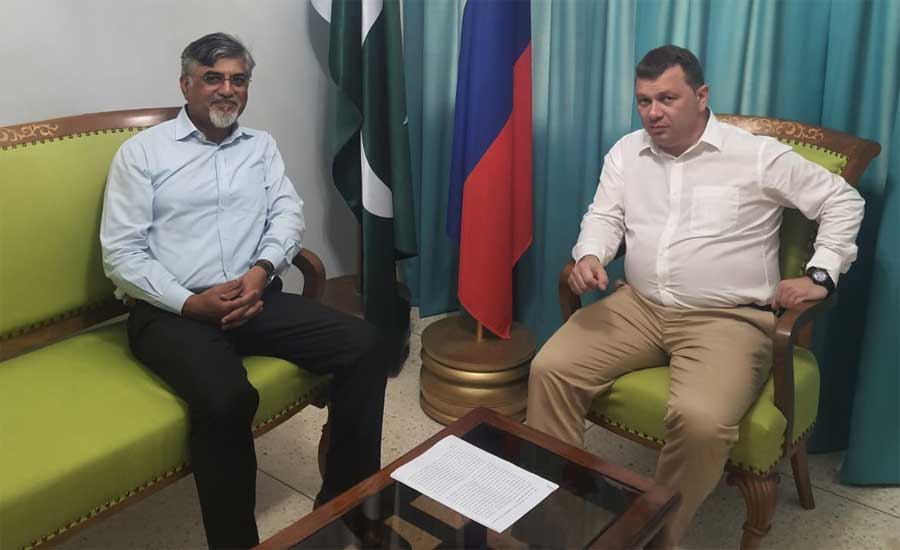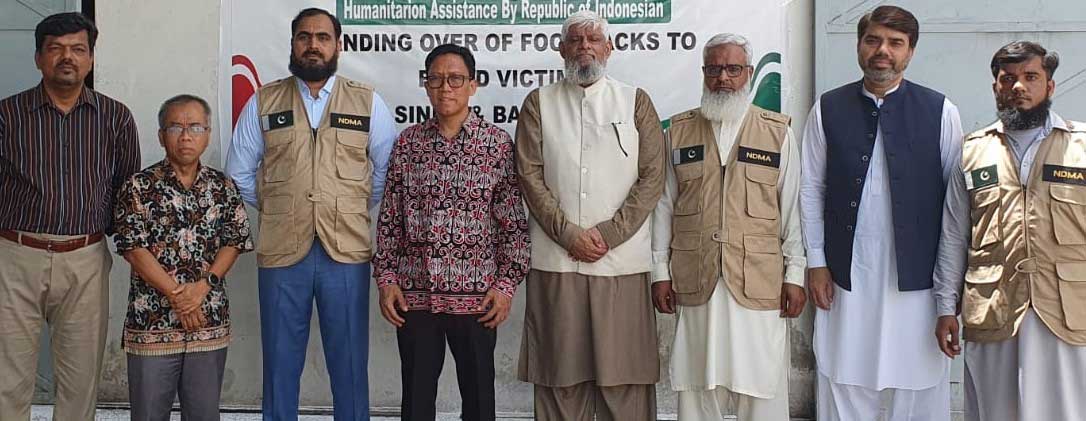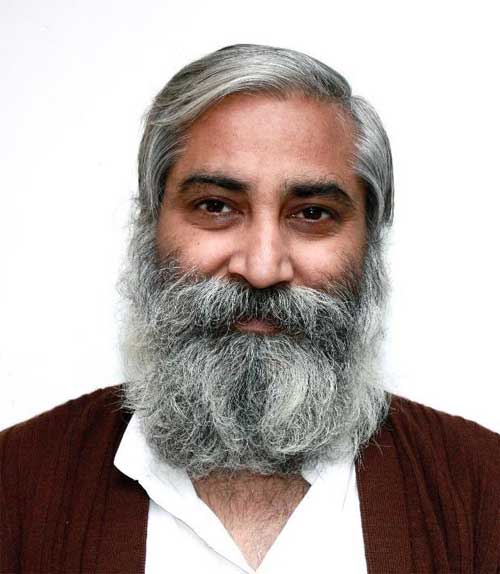Dr Muhammad Ali Ehsan
An interview with Honorable Consul General of the Russian Consulate in Karachi, Mr. Andrey V. Fedorov on the occasion of 75th Anniversary of the Establishment of Diplomatic Relations Between Russia and Pakistan. The interview was conducted by Dr Muhammad Ali Ehsan on 16th May at the Russian Consulate in Karachi
Question: What are your thoughts on May 1 as the 75th anniversary of the establishment of relations between Russia and Pakistan?
Answer: This year marks a very important milestone in our relations – a 75th anniversary of the establishment of the diplomatic ties between Russia and Pakistan. The relations between our countries were cemented in May 1, 1948, and since then they went through different historic times and development stages. There were ups and downs, highs and lows, ebbs and flows. However, the biggest paradox is that even during the Afghan War in the 1980s, when the USSR-Pakistan relations were particularly strained, not only were the diplomatic ties not terminated, but new projects and new agreements continued to appear as well. The most prominent example is the Pakistan Steel Mill in Karachi. Zulfikar Ali Bhutto laid the foundation stone for the Steel Mill in 1973, and in 1985, during Ziaul Haq presidency, it was completed and the steel production was launched. Furthermore, other projects like Guddu Thermal Power Station in Northern Sindh were built in the 1980s. At the current times, such consistent, sensible and mutually beneficial cooperation could be a role model for many countries!
One of the most important episodes in the history of our diplomatic ties is the Tashkent Declaration. When the escalation happened between India and Pakistan in 1965, the USSR was genuinely interested in establishing peace in the region, which is why it offered help and mediation. Thus, in January 1966, the Soviet Union hosted the meeting between Pakistani and Indian leaders Muhammad Ayub Khan and Lal Bahadur Shastri, respectively. Soviet delegation was led by the prominent and respected then-Premier Alexey Kosygin who played a key role in these negotiations. As a result of the talks, the well-known Tashkent Declaration was signed in January 10, 1966 that practically secured the peace in South Asia and allowed Pakistan and India to restore diplomatic and economic relations. This event established the rich legacy of Pakistan-Russia relations which, in my opinion, needs to be preserved vigilantly.
One of the most interesting episodes of our partnership was the story about the hijack of the plane by the criminals from Soviet Union in 1990. For some reason they decided that Pakistan is a safe haven where they can evade their well-deserved prison sentence, and landed their plane in Karachi airport. Rather, the Pakistani Special Services conducted a brilliant operation to free the hostages and imprison the miscreants. They convinced the hijackers that they are welcomed here in Karachi and lured them into jail. As a result, the people were released without a single victim and the terrorists were punished. This proved Pakistan’s firm position that there cannot be any compromise with terrorists, no matter which country they are from.
The collapse of the Soviet Union did not disrupt our relations in any way. For instance, Pakistan was one of the first countries with which Russia signed the agreement on mutual visa-free entrance by diplomats in 1994. There was also a series of the high-level visits of the leaders of both countries. In 2003, Pakistani President Pervez Musharraf met with Russian President Vladimir Putin in Moscow. Then, Russian Prime Minister Mikhail Fradkov paid a three-day official visit to Islamabad in 2007, where he also held talks with Pervez Musharraf. During these interactions, a wide scope of our bilateral partnership was discussed. As for the more recent events, I shall recall the visit of Russian Defence Minister Sergei Shoigu to Islamabad in 2014, the first ever visit of Russian Defence Minister to Pakistan. Then, in April 2021, Foreign Minister of Russia Sergei Lavrov arrived in Pakistan, where he met with the former Prime Minister of Pakistan Imran Khan and the former Chief of Army Staff Qamar Javed Bajwa. During this visit, the situation in Afghanistan was the primary issue on the agenda.
Recently, our bilateral ties have been definitely strengthened. This was reflected in the Russian-Pakistan Inter-governmental Commission on Trade, Economic, Scientific and Technical Cooperation, which was held this year in Islamabad on January 18-20. Less than two weeks later, on January 30, Pakistani Foreign Minister Bilawal Bhutto Zardari came to Moscow and met Sergey Lavrov. During these talks, our leaders expressed the willingness to develop cooperation in a wide range of spheres. Precisely, the energy sector, fight against terrorism, trade and economic partnership, humanitarian, cultural and educational cooperation.
Russia-Pakistan partnership is developing in a military cooperation as well. During the aforementioned visit of Sergei Shoigu in 2014, the two countries signed a Military Cooperation Pact. Since then, Russia and Pakistan have been regularly conducting anti-terror military drill “Druzhba”, which means “Friendship”. Furthermore, in February 2021 Russia participated in Multinational naval exercise “Aman-2021”.
As I have already mentioned, the relations between Russia and Pakistan have just received a huge boost. The clearest manifestation of that was the fact that Russian President Vladimir Putin during his last address to the Federal Assembly mentioned Pakistan as one of the few countries with which Russia is eager to develop partnership. There is a particularly huge potential in the energy department with the agreement on the Pakistan Stream Gas Pipeline, which is aimed to tackle Pakistan’s energy woes. We also have a lot of untapped potential in almost every sphere of trade partnership. There is a whole load of unexplored business opportunities in Russia-Pakistan bilateral economic cooperation that should definitely be developed.
Question: May 9 (Victory Day) is celebrated as the main holiday in the Russian Federation. What, in your opinion, is the significance of this historical event as the foundation for the existing world order? Throw some light also on Pakistan and Russia relations in the context of ongoing Russian-Ukraine crisis.
Answer: Victory Day celebrated on May 9 is truly the most unifying holiday in Russia, which embraces all generations and ethnicities. The main reason is that more than 27 million Soviet people died during the World War-II and there is not a single family in Russia that was spared by this terrible conflict. That is why we always remember and honour this unprecedented sacrifice.
The Victory against one of the biggest scourges on Earth is not a distant memory for all of us – it is our moral pillar, the benchmark of our endeavors and ideas, actions and deeds. That said,this holiday will always have a tremendous spiritual and moral significance for us!
I should emphasize that the history of the cooperation between our nations started even before Pakistan’s independence, when its soldiers fought against Axis countries as part of an Allies coalition. We will never forget the heroic deed of our Pakistani friends as well, despite of all the attempts by some nations to rewrite history. In that sense, we share our Victory with the people of Pakistan!
The defeat of Nazism allowed the countries who emerged victorious to establish a principally New World Order. The United Nations organization, incorporated within a Charter of laws, became an international arbiter that has contained the world from spiraling into another destructive conflict for the last 80 years. This system has not been ideal by any means, but it has provided a universal benchmark for every country to follow and allowed to hold accountable any power, which decided that it was above any laws.
Question: What in your opinion is the difference between international law and western world order based on their rules? How would you reason and justify the ongoing Special military operation in Ukraine?
Answer: Nowadays, we witness an alarming trend of Western countries trying to substitute international laws with the “world order, based on rules”. This policy undermines the very core fundamentals of our international system and can lead to an irreversible political crisis, if the West will continue to recklessly promote their vague “rules” in place of the UN Charter principles. In fact, such system based on “rules” is xenophobic in its core and carries neocolonial tendencies in itself. As it was pointed out by the Russian Foreign Minister Sergei Lavrov, “This order presupposes a racist division of the world into a group of exceptional states that a priori have the right to do everything they want and all other countries that must follow in the wake of the Golden Billion and cater to its interests”. In addition to this statement, I would like to put forward the following questions – who are they to create such rules? Who delegated them the right to impose them on every nation? Do they possess the highest moral ground to create them? Or maybe they possess higher moral ground, which gives them carte blanche to be the ultimate vigilantes? I think the answers to these questions are pretty obvious.
Thus, I would like to emphasize that Russia started the special military operation in Ukraine in accordance with Article 51 of the UN Charter and in execution of the treaties of friendship and mutual assistance with the Donetsk People’s Republic and the Lugansk People’s Republic. We had to finally put an end to the outrageous discrimination of the Russian people in Donbas and eliminate direct threats to the security of the Russian Federation that the United States and its satellites have been creating on Ukrainian territory for years. For a very long period of time, we have been making efforts to reach out to Ukraine and West at the negotiation table. Russia has consistently been trying to solve the crisis through dialogue trying to convince the US and European countries not to drag Ukraine into NATO, as it created direct security threats for us. However, all our proposals and solutions have been constantly rejected.
Question: Would you throw some light on the current Foreign Policy of the Russian Federation? Do you think that there is a shift of priorities from West to Asia? If so, what about our bilateral relations prospects in this regard?
Answer: In wake of the deepest crisis in the global politics, Russia adopted a new Concept of Foreign Policy. This is a strategic planning document, which provides a systemic vision of the national interests of the Russian Federation in the domain of foreign policy. It highlights the main current trends in the international relations: the formation of multi-polar world order, the rejection of this evolution by the neocolonial Western powers, serious pressure on the UN legal framework, the crisis of economic globalization, the increase of the “power factor” role, and, finally, the growth of Asia’s influence. Following these changes and in order to eliminate the unjust hegemony of the West, Russia prioritizes to support regional integration with friendly nations, improve international mechanisms for ensuring security and development at the global and regional levels and restore the UN’s role as the central coordinating mechanism in reconciling the interests of UN member states.
As for our relations with Pakistan, according to the new Concept of foreign policy, one of our main goals is to strengthen the potential of cooperation within Shanghai Cooperation Organization, which Pakistan is a member of. This shall give another very powerful boost to our mutually beneficial cooperation.




